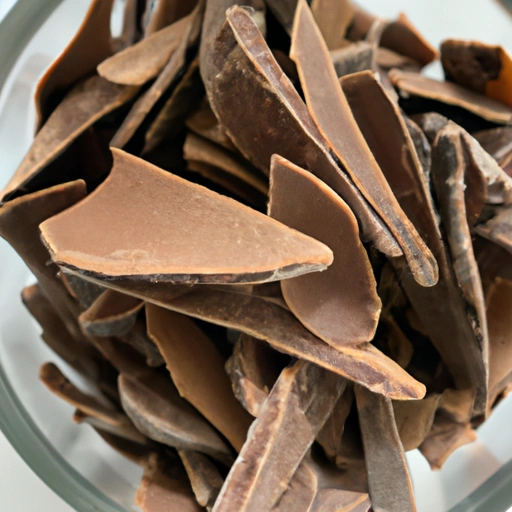Carob Chip
Description

Carob chips are a sweet and versatile ingredient commonly used as an alternative to chocolate chips. Derived from the carob tree (Ceratonia siliqua), these chips are made from the dried and roasted pods of the tree, which are then ground into carob powder and formed into chip-like pieces. They are naturally sweet, with a flavor that is similar to, but distinct from, chocolate, and can be used in a variety of culinary applications.
Common uses
Carob chips are commonly used as a direct substitute for chocolate chips in baking, trail mixes, and as a topping for various desserts. They are also used in health bars, granola, and other snack foods, providing a naturally sweet taste without the caffeine and theobromine found in chocolate.
Nutritional value
Calories
A 1-ounce serving (about 28 grams) of carob chips contains approximately 153 calories (640 kilojoules).
Protein
Carob chips contain around 1 gram of protein per 1-ounce serving.
Fat
There are about 9 grams of fat in a 1-ounce serving of carob chips, which can vary depending on additional ingredients such as added oils.
Carbohydrates
Carob chips have approximately 17 grams of carbohydrates per 1-ounce serving.
Vitamins
Carob chips provide small amounts of B vitamins, particularly vitamin B2 (riboflavin).
Minerals
They are a good source of minerals such as calcium, with about 100 milligrams per 1-ounce serving, and also contain iron and potassium.
Health benefits
Carob chips offer several health benefits, including being a caffeine-free alternative to chocolate, which makes them suitable for individuals with caffeine sensitivities. They are also rich in dietary fiber, which can aid in digestion, and the presence of antioxidants like polyphenols can help counteract damage from free radicals. Additionally, carob is low in fat and sodium, making it a heart-healthy option.
Potential risks
While carob chips are generally considered safe for consumption, overindulgence can lead to gastrointestinal discomfort due to their high fiber content. As with any food, it is possible for some individuals to have an allergic reaction to carob. Furthermore, commercially available carob chips may contain added sugars and fats, so it's important to check the ingredients list for potential dietary concerns.
Common recipes
Carob chips can be used in a plethora of recipes, such as carob chip cookies, muffins, pancakes, and even in homemade ice cream. They are also fantastic when melted down and used in carob-based sauces or frostings.
Cooking methods
Carob chips can be melted similarly to chocolate chips, either in a microwave or using a double boiler. They can also be baked into goods, or simply sprinkled over a finished product as a garnish.
Pairing with other ingredients
Carob chips pair well with nuts like almonds and peanuts, fruits such as bananas and strawberries, and grains like oats and quinoa. They also complement the flavors of vanilla, cinnamon, and coconut.
Summary
Carob chips are a delicious and healthful ingredient that can be used in various culinary applications. With their sweet, unique flavor and chocolate-like appearance, they are great for those looking for a chocolate alternative due to allergies, caffeine sensitivity, or dietary preferences. Carob chips are not only tasty but also bring a range of nutritional benefits to the table, making them a valuable addition to any pantry.